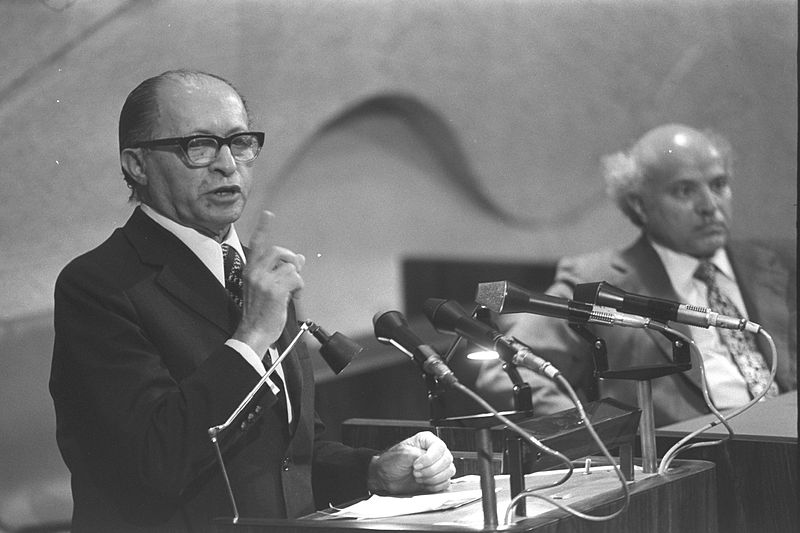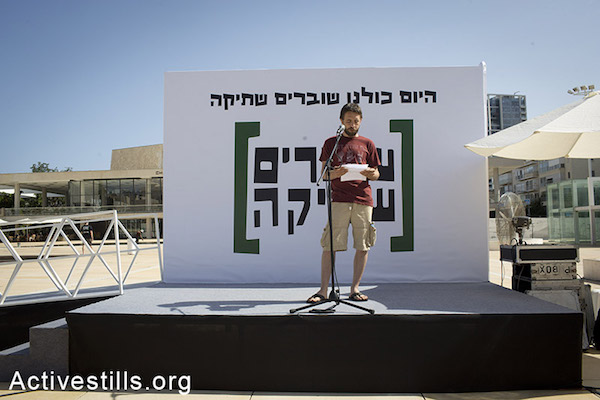The Right doesn’t reject the concept of universal human rights because it threatens the Zionist project, they do so because it would mean seeing Palestinians as equals.
By Dror Etkes

There is a positive aspect to the continuing, orchestrated campaign by Israel’s right-wing government and its helpers against “leftist” organizations, which many seem not to be paying attention to. As the campaign goes on, it helps create an intuitive, collective understanding for most people who have refrained from dedicating their life to understanding the inner politics of left-wing organizations in Israel, that there is no room for the artificial barrier dividing human rights organizations from other left-wing groups, under the pretense that these are “professional” and “apolitical” organizations.
The ideas that eventually turned into the articles anchored in the UN’s Universal Declaration of Human Rights — which was formulated several years after World War II — grew out of the minds of the same people who understood that every kind of power that rests in the hands of one group will eventually corrupt that group and harm society at large. The view according to which every human has a number of basic rights split into various schools of thought. Some went toward the economic right, which believes in the ideas of a free market and entrepreneurship that sanctify the individual talents of each person.
Others tended toward the left side of the spectrum, which demands that the powers of the market must be limited out of respect for every human, and that the means of production (or at least some of them), must remain in the hands of society. Either way, no one can ignore the fact that in the modern age, and especially in throughout the 20th century, these ideological movements that grew out of the Right and the Left were responsible for the deaths of tens of millions of people.
I will not try to establish universal truths about the connection between human rights and the political left, but rather say something about the relationship between the two as has been formed in the Israeli context since the occupation in 1967, and especially as they have been formed in the Israeli public over the past few decades.

In post-1967 Israel, and especially following the Likud party’s rise to power in 1977, the Right has only entrenched its scorn for human rights. This, put simply, is because the settlement project and Judaization of the West Bank, the fundamental tenets of the Israeli Right, deprives the human rights from millions, while leading to recurring bouts of violence.
The affinity between the Right and its scorn for human rights, which has only strengthened over the years, has brought about the gradual evaporation of what was once called the Likud’s “moderate camp.” This evaporation preceded the expected disappearance of Defense Minister Moshe Ya’alon, who has been tagged as a “radical leftist” following the Hebron shooting — a position only slightly to the left of Prime Minister Netanyahu (who is himself on borrowed time) within his party.
Human rights vs. nationalism
Here is a more precise description of the ties between human rights organizations and the political sphere: despite the fact that the Israeli “Left” camp (which, let’s not forget, threw its support behind the nascent settlement project) is far from being identified with an agenda that backs human rights, the Israeli Right has raised the flag of rejecting and violating those very human rights. Several groups have popped up over the last few years call themselves human rights organizations (usually pro-settlement groups) — despite undermining the important and revolutionary concept of the universalism of human rights.

It is worth quoting Ze’ev Sternhell’s latest article in Haaretz [Hebrew], in which he lays out the three political principles of the political Right in the West as well as Israel:
The first principle sees liberal democracy — viewed in the West as a social order intended to realize the worldview according to which human rights promise equality for all — as a danger to the nation and the state. For the Right, recognizing human rights as a fundamental principle of the political order leads to the conclusion that Jews in Israel have no privileges, and that their historical rights aren’t enough to reject the Arabs’ right to independence and partial ownership of the land. For the Right, human rights undermine the very fundamentals of Zionism: Zionism which was not a necessity and a solution to the “Jewish problem”. Zionism which did not establish itself to realize the Jewish right to self-rule, but rather to assert their privileged right to all the land.
Add to Sternhell’s words the Right’s war against separation of powers — and specifically against the High Court’s attempts to oversee and limit the state’s attempts to perpetuate its rule over Palestinians — and we get an updated picture of the ideological Right in Israel.
To summarize, even if it clear that not all the movements or people who seek to reach a historical compromise with the Palestinians do it out of an obligation to human rights, all those who work in the field of human rights and believe in the idea that every human has basic, agreed-upon rights, go against right-wing dogmas and thus are considered “leftist.”
Thus, if we accept the notion that politics is the realm in which once in a while moral decisions are also made, it is clear that the universal principle of human rights collides with the Right’s nationalistic particularism. Let us then listen to the spokespeople of the Right: they know exactly why they are going to war against human rights organizations.
Dror Etkes follows Israel’s land and settlement policy in the West Bank. This article was first published in Hebrew on Local Call. Read it here.

